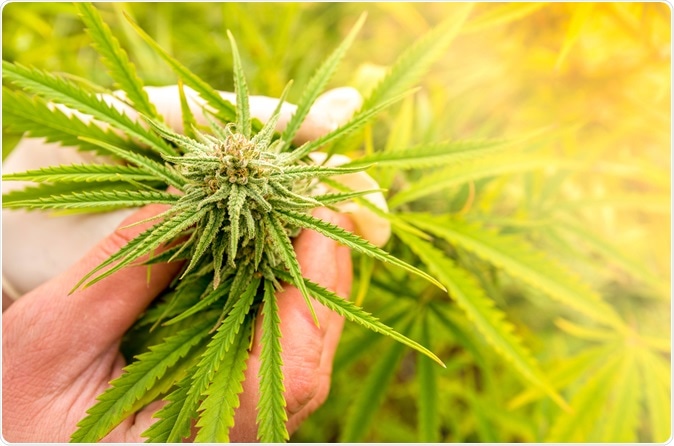There is a growing demand among consumers for marijuana containing products supposedly providing several health benefits in a range od diseases and conditions. This has spawned thousands of websites that are selling these products online. Many of these contain mislabeled cannabidiol (CBD) or a compound found in cannabis or marijuana finds a new study.
The study titled, “Labeling Accuracy of Cannabidiol Extracts Sold Online,” was published this week in the Journal of the American Medical Association JAMA. The study was conducted by the researchers at University of Pennsylvania Perelman School of Medicine.

Cultivation of marijuana (Cannabis sativa) Image Credit: Kojin / Shutterstock
At present medicinal marijuana is legal in 29 states including the District of Columbia and illegal elsewhere. CBD containing products are not approved or legal in all of these regions. This means that these CBD containing products do not have the seal of approval and quality check and assurance from the U.S. Food and Drug Administration (US FDA). The contents that are labeled in any medication approved by the US FDA also undergo rigorous procedures and checks to ensure accurate labeling. Since these products are not approved by the FDA, they do not have standardized and accurate labels, finds the study. Online CBD containing products include formulations such as oils, tinctures, vaporization liquids etc.
Study authors Marcel Bonn-Miller, PhD, assistant professor of psychology in psychiatry at the University of Pennsylania and Brian F. Thomas, Ph.D., principal scientist in Analytical Chemistry and Pharmaceutics at RTI International and colleagues found that nearly 70 percent of the CBD containing products sold online have misinformation on their labels. The researchers call upon the state regulatory agencies to ensure labeling is accurate. Thomas says that the study report is similar to what the FDA recently found in three different analyses in 2015, 2016 and as recent as November 2017. He explained that many of these products need to be established in their safety and efficacy before they can be sold to the general public.
For this study the team went on to purchase 84 CBD containing products that are available online from 31 companies. They found that nearly half of the products (43 percent) contained CBD levels higher than what was on their labels. On the other hand 26 percent contained less CBD than labeled. In addition at least one in five products contains THC (tetrahydro cannabinol). THC can produce a high unlike CBD alone. Medical CBD should not contain THC say researchers said Marcel Bonn-Miller. Liquid versions of the drugs to be vaped had 88 percent inaccurate labels finds the study. Oils were mislabeled in 55 percent samples. Only 31 percent of all samples were accurately labeled. Accurate labels means CBD content within 10 percent of the labels.
The authors speculate that this high incidence of mislabeling could be dangerous for the consumers. Many unapproved CBD formulations are being used for certain conditions in children such as intractable or severe epilepsy. In these children these could be dangerous they write.
Marcel Bonn-Miller said, “More and more evidence is coming out that CBD can be helpful for a variety of conditions, from anxiety to inflammation to seizures and epilepsy” and this has spurred their use in these unapproved indications leading consumers to buy them online. Chronic pain, cancers, post traumatic stress disorder (PTSD), autism, anxiety, sleep disorders, inflammation have all shown promise with medicinal marijuana in experimental studies.